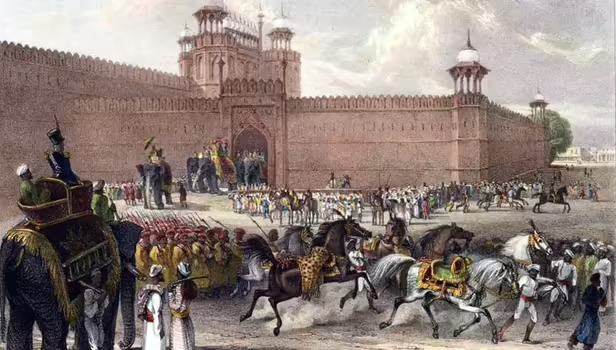Will Indians Only Embrace Sanatana Dharma When the West Sells It Back to Them?
Nidhi | Jan 31, 2025, 14:27 IST
This article explores the paradox of India’s spiritual practices, rooted in Sanatana Dharma, being embraced by the West while struggling for recognition within India. It discusses how yoga, Ayurveda, and mindfulness have gained global popularity, yet many Indians only reconnect with these traditions after they’re validated abroad. The article also highlights the cultural divide, colonial legacy, and the influence of Westernization on the younger generation’s disconnect from their heritage, with recent examples like the Kumbh Mela attracting international attention.
"Sometimes, the things we seek validation for are the things that were always our own."This thought-provoking line seems to resonate deeply when we look at India's relationship with its own spiritual and cultural heritage. For centuries, India’s wisdom, rooted in its ancient traditions and Sanatana Dharma, was a guiding light for the world. Yet, in recent decades, there has been a strange paradox: India, the birthplace of these practices, has often overlooked or undervalued them, while the West, in its own search for meaning, embraced and rebranded these very traditions. Why is it that India, despite being the originator, finds it necessary to seek validation from the West to reconnect with its own cultural legacy?
 India’s spiritual and cultural heritage, rich in practices like yoga, Ayurveda, and meditation, has long been a source of wisdom. But in recent times, it often feels like this knowledge was left behind in favor of modernity. Yet, the West, ever the seeker of new trends, has rediscovered these practices and presented them back to India as "the next big thing." And now, India is revisiting what it once had but dismissed.
India’s spiritual and cultural heritage, rich in practices like yoga, Ayurveda, and meditation, has long been a source of wisdom. But in recent times, it often feels like this knowledge was left behind in favor of modernity. Yet, the West, ever the seeker of new trends, has rediscovered these practices and presented them back to India as "the next big thing." And now, India is revisiting what it once had but dismissed.
 Yoga, an ancient spiritual practice deeply tied to India's heritage, was once a vital part of Indian life. Yet, it was the West that rediscovered yoga, stripping it of its spiritual roots and transforming it into a fitness craze. Only when yoga became a global wellness trend did India realize the profound benefits of its own practice. Today, yoga is no longer just about physical flexibility but has evolved into a holistic approach to health—thanks to the West’s rebranding, India is embracing its true essence once again.
Yoga, an ancient spiritual practice deeply tied to India's heritage, was once a vital part of Indian life. Yet, it was the West that rediscovered yoga, stripping it of its spiritual roots and transforming it into a fitness craze. Only when yoga became a global wellness trend did India realize the profound benefits of its own practice. Today, yoga is no longer just about physical flexibility but has evolved into a holistic approach to health—thanks to the West’s rebranding, India is embracing its true essence once again.
India's ancient healing system, Ayurveda, has been practiced for thousands of years, offering a comprehensive approach to well-being. Yet, modern India often turned its back on this tradition, opting for Western medicine. Ironically, it was the West that embraced Ayurveda for its natural remedies, helping it gain recognition worldwide. Now, as Ayurveda becomes increasingly popular in the West, India is finally rediscovering its potential, realizing that the ancient wisdom is indeed valuable—perhaps even more than ever.
Meditation, once a deeply spiritual and philosophical practice in India, has been adopted by the West as a tool for mental well-being. The practice of mindfulness, rooted in India’s spiritual traditions, became mainstream in the West as a powerful antidote to stress and anxiety. What was once an esoteric practice has now been packaged as a universal solution. India, initially dismissing it as a niche spiritual endeavor, is now re-embracing it, albeit through the lens of global wellness.

It’s one thing to rediscover ancient wisdom; it’s another for the younger generation in India to embrace it fully. As globalization surged and Western ideals became synonymous with progress, many Indians—especially the youth—seemed to have lost touch with the country’s rich cultural roots. The validation of these practices by the West seems to hold more weight, making it difficult for Indians to see the value in their own traditions.
The Kumbh Mela, one of the largest spiritual gatherings on Earth, is a powerful example of India’s rich heritage drawing global attention. Each year, millions of people, including foreign tourists, gather at the banks of sacred rivers for ritual bathing that purifies the soul. This is a festival that has been taking place for centuries, yet it’s only in recent years that its global significance has truly been recognized.
And this year, the scale of global interest in the Kumbh Mela is staggering. Over three million foreign tourists are expected to attend the event at Prayagraj, double the initial estimate. This number accounts for nearly a third of the total foreign tourists who visited India last year. The Kumbh Mela isn’t just a spiritual event for Indians anymore; it has become a pilgrimage for people across the world who want to experience its sacred rituals firsthand.
The Kumbh Mela, a festival deeply rooted in Indian tradition, is now attracting famous foreign personalities, signaling a deepening global connection to India’s spiritual practices:
India’s Internal Struggle: The Need for Validation
The younger generation in India, particularly those raised in the age of globalization, has grown up in a world dominated by Western pop culture, technology, and media. Western brands, lifestyles, and ideals of success have shaped the aspirations and outlooks of many Indians. As a result, there is a growing trend of disassociation from India’s spiritual and cultural roots. In the pursuit of modernization and the allure of the West, traditional Indian values and practices often seem outdated or irrelevant.
This cultural divide often leads to a sense of inferiority, as the West’s validation is seen as a necessary endorsement of anything worthwhile. In a world where success is often defined by global recognition, many Indians look to the West for approval, even when it comes to their own spiritual practices. This creates a paradox where India’s own wisdom, such as that found in Sanatana Dharma, is more readily embraced when the West celebrates it, despite it having originated in India.

India’s history of colonization created deep-rooted psychological scars, where Western systems were imposed as superior. Post-colonization, India became absorbed with the idea that progress and modernity were synonymous with the West. Over time, this mindset persisted, and Western validation became a benchmark for worth. This legacy still shapes the way many Indians view their own cultural and spiritual heritage.
In today’s globalized world, external validation, especially from the West, has become a powerful tool for gaining acceptance and credibility. The younger generation is constantly exposed to Western ideals and practices through media, social platforms, and international influences. As a result, there’s a tendency to dismiss or underestimate the value of India’s own cultural practices unless they are recognized globally.
When the West Found Wisdom in What India Left Behind

West turn into Santana Dharma
Yoga: A Global Trend Revived in the West

Yoga
Ayurveda: A Healing Tradition Rediscovered
Meditation and Mindfulness: The West’s Spiritual Escape
Why Does India Need the West to Validate Its Traditions?

College Students
It’s one thing to rediscover ancient wisdom; it’s another for the younger generation in India to embrace it fully. As globalization surged and Western ideals became synonymous with progress, many Indians—especially the youth—seemed to have lost touch with the country’s rich cultural roots. The validation of these practices by the West seems to hold more weight, making it difficult for Indians to see the value in their own traditions.
The Kumbh Mela: A Spiritual Gathering that the World Can't Ignore
And this year, the scale of global interest in the Kumbh Mela is staggering. Over three million foreign tourists are expected to attend the event at Prayagraj, double the initial estimate. This number accounts for nearly a third of the total foreign tourists who visited India last year. The Kumbh Mela isn’t just a spiritual event for Indians anymore; it has become a pilgrimage for people across the world who want to experience its sacred rituals firsthand.
Foreign Icons at the Kumbh: The West’s Deepening Connection to India’s Spirituality
- Laurene Powell Jobs, the wife of the late Steve Jobs, visited the Kumbh Mela, underscoring the growing interest among the global elite in Indian spirituality and culture. Her visit, like many others, brought a sense of reverence for the ancient practices that have long been part of India's identity.
- Chris Martin, lead singer of Coldplay, and his partner Dakota Johnson, visited the Maha Kumbh in Prayagraj, immersing themselves in the spiritual atmosphere of the event. Their presence not only highlights the international appeal of India’s spiritual festivals but also signals the West's ongoing fascination with India’s ancient traditions.
India’s Internal Struggle: The Need for Validation
The Impact of Westernization on Indian Identity
This cultural divide often leads to a sense of inferiority, as the West’s validation is seen as a necessary endorsement of anything worthwhile. In a world where success is often defined by global recognition, many Indians look to the West for approval, even when it comes to their own spiritual practices. This creates a paradox where India’s own wisdom, such as that found in Sanatana Dharma, is more readily embraced when the West celebrates it, despite it having originated in India.
The Colonization Legacy: The Desire for External Validation

Colonial Rule
India’s history of colonization created deep-rooted psychological scars, where Western systems were imposed as superior. Post-colonization, India became absorbed with the idea that progress and modernity were synonymous with the West. Over time, this mindset persisted, and Western validation became a benchmark for worth. This legacy still shapes the way many Indians view their own cultural and spiritual heritage.
